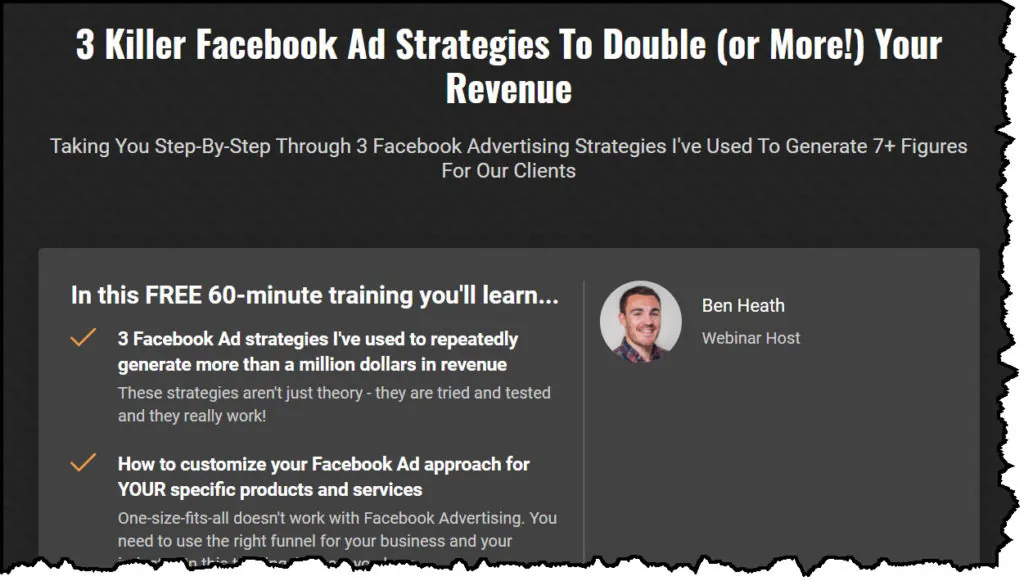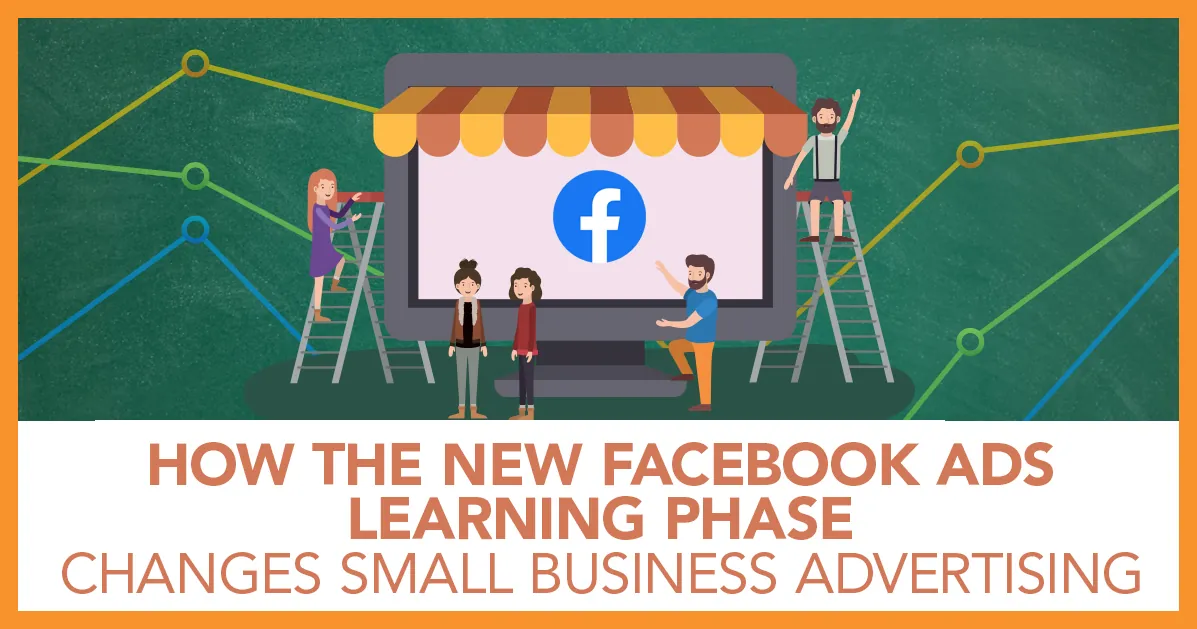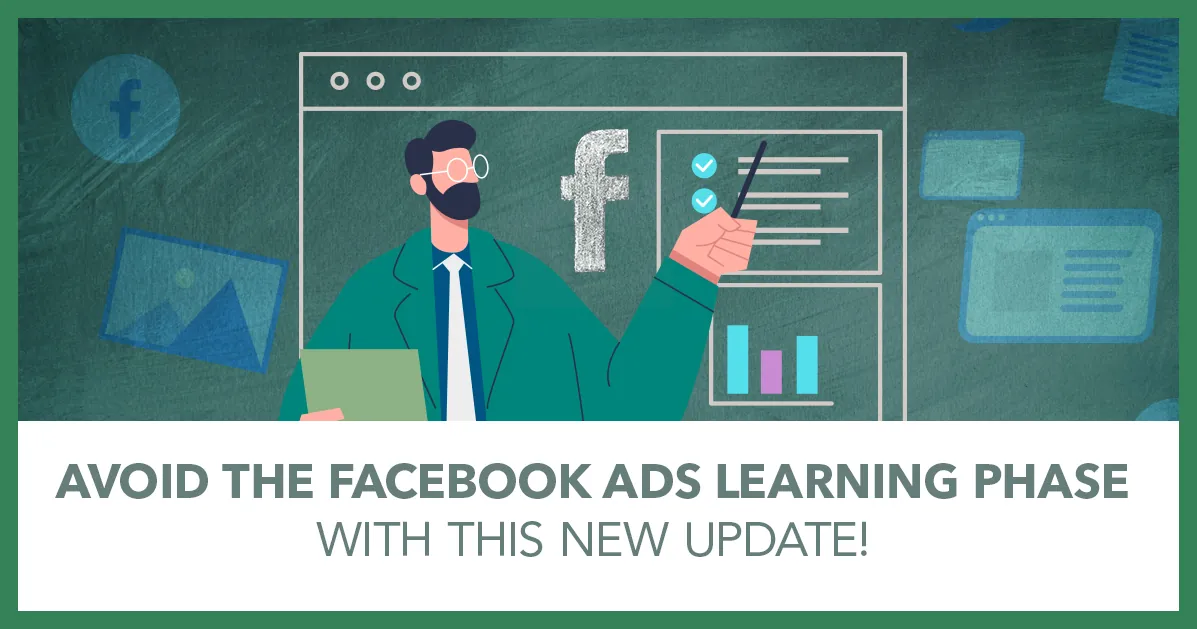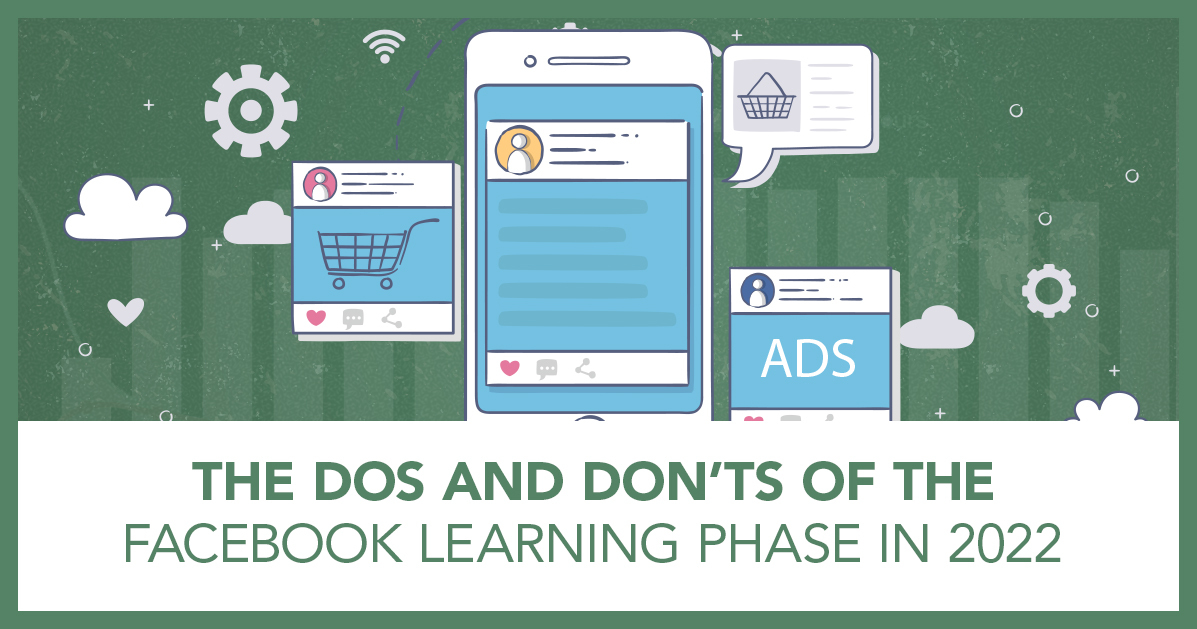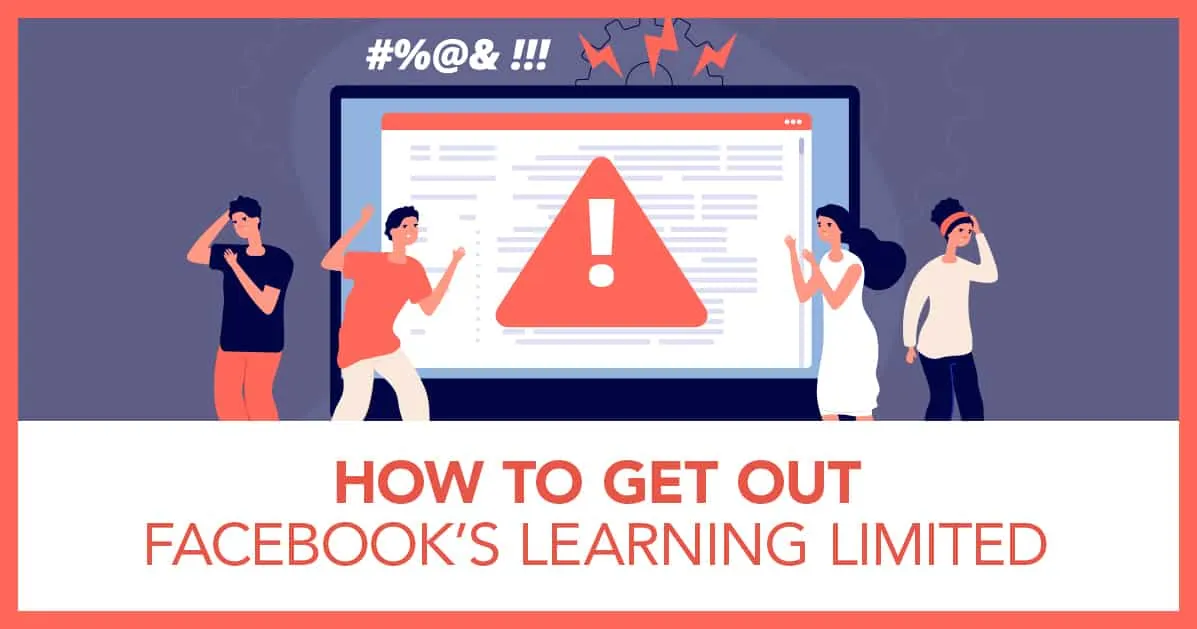
How to Get Out of Facebook’s Learning Limited
I get a lot of people commenting and writing about Facebook’s learning limited status. They want to know what it means, if they need to get out of it, and how to get out of the learning limited status on Facebook.
Facebook has an entire page dedicated to this topic.

Facebook wants you to have at least 50 conversion events a week in order to fully optimize your campaigns. They will put your campaign in learning limited status if you don’t have enough conversion events to meet the 50 event threshold. Conversion events refer to the event you have your campaign optimized for. This is usually leads, add to carts, or sales.
Usually, what Facebook is trying to get you to do is raise your advertising budget to get to the 50 event threshold.
However, raising your budget just to get out of the learning limited status isn’t always a great idea.
How to Get Out of the Learning Limited Status on Facebook
Facebook has some suggestions on how to get out of Learning Limited status with your campaigns. The advice isn’t bad, but it lacks the nuance you need to run real world campaigns that convert.
In this guide I’m going to show you the different ways that Facebook says you can use to get out of learning limited status and show you when and why you should or shouldn’t use each one.
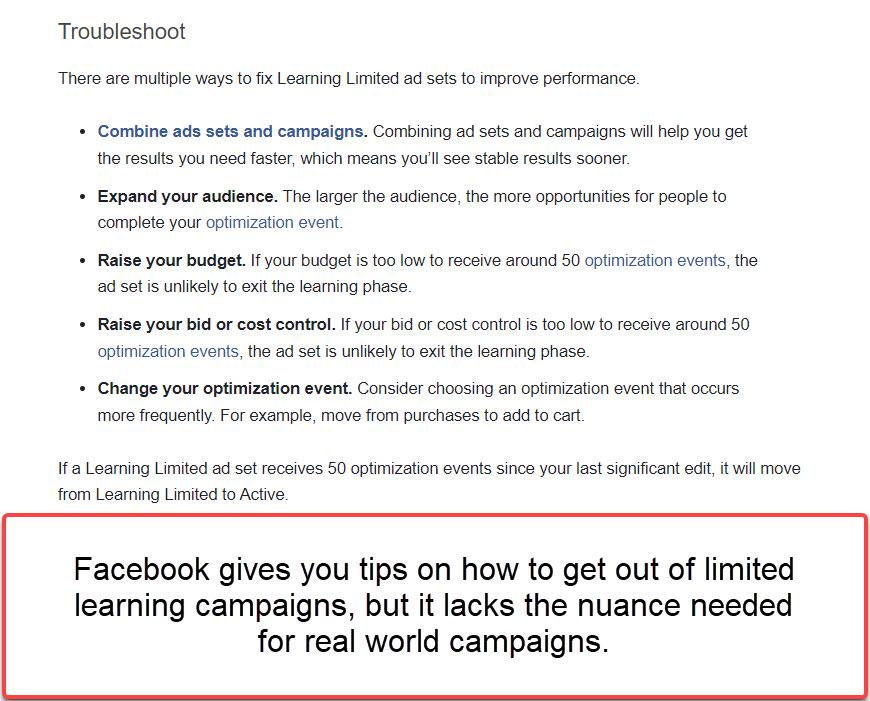
Before I get into each of Facebooks suggestions and why you should or shouldn’t use them, I want to make sure that you know that you don’t HAVE TO meet the 50 conversion weekly threshold to have Facebook optimize your campaigns successfully. You may not get the full optimization effect, but Facebook will still optimize the best they can with the data you give them.
Don’t let the limited learning status intimidate you into changing your campaign if you have a profitable campaign running that’s working well for your business. Always prioritize your business objectives over what Facebook is suggesting you do.
If you sell super high end items or services you may never need 50 leads in a week. You might need 1 or 2. If you run out of stock you should pause your campaigns rather than worry about the learning phase in Facebook.
The bottom line is that your business and your business objectives should always come first.
Now that I have that out of the way, lets take a look at the suggestions Facebook offers and I’ll tell you my opinion about when you should and shouldn’t implement them.
Combine Ads Sets and Campaigns

If you are running multiple campaigns and ad sets to the same or very similar offers, then Facebook recommends that you bundle those together into a single campaign. This creates larger audiences for Facebook to work with and it can help the performance of your campaigns.
Resource: It’s important to know what audience sizes are ideal for Facebook. The answer is often “bigger than you think.” I have a blog post called The Ideal Facebook Ads Audience Size that you can reference here.
The other thing that combining ad sets and campaigns does is consolidate your budget to create more conversion events. If you have three campaigns at $30 each per day and combine them then you will be spending $90 a day in a single campaign. The increase in budget in a combined campaign can potentially increase your conversions so they go over the threshold.
You want to combine your ad sets and campaigns IF you are past the phase of testing your ad sets to see which ones work the best.
There is a lot of value at the beginning of a campaign in breaking up your cold traffic ad sets so that you can see which audiences are the ones that will work for you in this campaign. I don’t recommend combining campaigns and ad sets until you have this data.
Once you have the data on the audiences that convert for you and are moving on to testing creatives, then combining ad sets and campaigns makes a lot of sense.
Expand Your Audience

Many years ago targeting small audiences with your Facebook ad campaigns could work well. Now, targeting larger audiences is almost always a better idea. When you target more people you give Facebook more data to work with and it’s easier for the algorithm to optimize your campaign.
The only exception to this is a retargeting audience, which is usually limited by it’s nature.
Expanding your audience is usually one of our first go to methods for getting the clients at our agency out of limited learning. There isn’t a lot of downside here. It’s worth trying.
Raise Your Budget

Personally, I think that this is MOST LIKELY what Facebook really wants you to do when they make limited learning seem like something that needs to be fixed.
I would urge you to exercise caution here.
It’s 100% fine to raise your budget as long as it’s part of your overall strategy in your business. You don’t want to triple or quadruple your budget just to get out of limited learning. Scaling like that can create huge jumps in cost per conversion and that’s never a good thing.
Instead, when you have winning campaigns you should scale your campaigns incrementally in a way that makes sense for your business and your business goals.
Resource: Scaling Facebook ad campaigns and increasing your budget can feel frustrating. Here’s a guide called How to Scale a Facebook Ad Campaign that can help you successfully scale your campaigns the right way.
Raise Your Bid or Cost Control

Usually at our agency we recommend that you don’t use a bid or cost control at the beginning of your campaign. When you are going through the learning phase of a campaign the costs can vary quite a bit. If you use a bid or cost control in the beginning of a campaign then it can cause real problems with campaign optimization.
If you want to do cost controls, then you should do them AFTER the campaign is through the learning phase.
Overall, this one is good advice and I would go one step further and remove bid and cost controls all together until the campaign is more mature and completely through the learning phase.
Change Your Optimization Event

The idea here is that if you move your optimization event higher in your funnel that you will be able to get more conversions events and get out of the learning phase.
This can work to move you out of the learning phase, but I would be very cautious with this approach.
For example, if you are getting 20 sales conversions a week and move your conversion event to add to cart you might end up with 60 ad to carts and move out of learning limited.
The downside is that you are now optimizing to add to carts when what you really want are sales. My experience tells me that you will then fill up your funnel with people who are very good at adding to cart and not necessarily very good at buying.
This is not one that I would recommend that you try.
Another Awesome Free Facebook Training Resource
There is nothing I like better than to see business owners increase their ROI with Facebook Ads. In order to help business owners succeed with Facebook ads I’ve created a FREE webinar training that you can register for here.
When you attend this webinar you’ll learn:
- 3 different Facebook ad strategies that we use every day. These strategies have generated millions of dollars in revenue and are tried and proven to work.
- How to customize the Facebook ads strategy to your particular business. There is no such thing as a one size fits all approach to Facebook ads.
- How Facebook and Instagram have changed and how to adjust your ad strategy to what works now!
Video Tutorial on How to Get Out of Facebook’s Learning Limited
Here’s a video tutorial on how to get out of Facebook’s Learning Limited status. I go over which of Facebooks suggestions I would use, which ones I would be cautious with and why.
The Bottom Line on Facebook’s Learning Limited Status
Facebook will flag a campaign with the learning limited status if it’s not making at least 50 conversions per week. There are several things you can do to get out of learning limited status. Some of them are worth it and some of them are not.
It’s also important to remember that learning limited status doesn’t mean you need to do ANYTHING at all. Sometimes your business doesn’t need 50 conversions a week. If you have a winning campaign that’s meeting the needs of your business and is in learning limited status that’s fine too. You can leave it in learning limited if its working for you.



